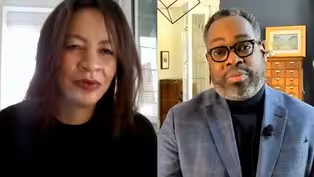
Healing from the mass shooting at Michigan State University
Clip: Season 51 Episode 8 | 5m 54sVideo has Closed Captions
How does Michigan State University start to heal after the Feb. 13 mass shooting?
As the Michigan State University community grapples with the Feb. 13 mass shooting at Michigan State University that left three students dead and hospitalized five others, Stephen Henderson sat down with Dr. Lekie Dwanyen, an assistant professor in MSU’s department of human development and family studies, to hear how the campus is coping with the tragedy.
Problems playing video? | Closed Captioning Feedback
Problems playing video? | Closed Captioning Feedback
American Black Journal is a local public television program presented by Detroit PBS

Healing from the mass shooting at Michigan State University
Clip: Season 51 Episode 8 | 5m 54sVideo has Closed Captions
As the Michigan State University community grapples with the Feb. 13 mass shooting at Michigan State University that left three students dead and hospitalized five others, Stephen Henderson sat down with Dr. Lekie Dwanyen, an assistant professor in MSU’s department of human development and family studies, to hear how the campus is coping with the tragedy.
Problems playing video? | Closed Captioning Feedback
How to Watch American Black Journal
American Black Journal is available to stream on pbs.org and the free PBS App, available on iPhone, Apple TV, Android TV, Android smartphones, Amazon Fire TV, Amazon Fire Tablet, Roku, Samsung Smart TV, and Vizio.
Providing Support for PBS.org
Learn Moreabout PBS online sponsorshipSo, I'm a parent at Michigan State University.
And I spent Monday night last week doing what every other parent was doing.
Trying to make sure my kid was safe.
I just want to have you start by talking about the atmosphere on campus.
The things that you're hearing from students about what happened and how they're feeling the effects of this.
And I think are immeasurable on the people who are part of the MSU community.
- You're absolutely right, Stephen.
My sense of the emotional energy and climate on campus is that students, faculty, staff, anybody who is affiliated with MSU, whether we were present there at the time or not, is experiencing a high level of distress.
We are emotionally experiencing fear, anxiety, worries of what this means for the families that are directly impacted.
How we can support one another as we cope with high levels of stress from the shooting.
So, the emotional climate is very, very tense, but it also is very supportive.
We have several opportunities that are arising to convene as a community and really try to form some understanding together around what happened.
Memorialize the lives that were lost as much as we really can in this moment.
- Yeah.
The kind of trauma that people experience when something like this happens is, I think, analogous to other really violent situations that most people don't experience, right?
War and those kind of inflects.
I really wonder how, outside the context of something like that, you deal with this kind of trauma.
How do you free students, young people who are experiencing something that most young people still, thank God, would never experience?
- When we experience events like this, even if we're exposed to the event virtually, we can experience a number of traumatic stress reactions that, again, are normal based on the way that we have to kind of metabolize this information or the experience.
So we might feel more jumpy or startled immediately after events like this.
Or for a period of time, we might not feel our sleep routine normalize.
We might get less sleep than we're used to.
We might want to ... For children for example, we might see our children want to sleep closer to us, or have a closer proximity.
So, we might also feel symptoms like being unable to eat in the same ways that we normally do.
Our digestive systems are impacted.
And so we want to give ourselves and our children a lot of flexibility and a lot of grace in these days following this event.
And for a period of time after, we wanna be checking in with ourselves asking how we're feeling, trying to verbalize it and allowing children and students the opportunity to verbalize how they're feeling as well.
And we want to validate ourselves and validate each other.
Because however we're feeling right now is normal to such an abnormal event.
- One of the things that I detected from my son when this happened was a sense that this is just the way the world is now.
And he's never been associated with a shooting like this, but they are happening with more frequency, and of course he knows about it.
That bothered me.
It bothered me that he didn't seem more bothered.
And I wonder what we're to make of that, that we are raising a generation of young people who think of this as more acceptable or just they make way for it in a way that, I think, should disturb us.
- Yes, and I would agree with you.
When we look at our societal context, and we see how common these events are, unfortunately, we can understand how youth and college students are not necessarily surprised by the event.
We saw students at Michigan State with paraphernalia supporting other schools that had just recently experienced shootings.
There are students here that have experienced school shootings before.
And so there is an element of that it is more common, but it is not normal.
When I say normal, I'm talking about our individual and our relational reactions to the traumatic event.
In that whatever we're feeling right now, or however we're coping, or however we feel our routine disrupted, we should normalize that for one another.
If you're having bad dreams, if you're feeling more startled or if you're feeling more irritable about things that normally didn't irritate you before, those are normal reactions.
And so we wanna offer ourselves a lot of flexibility in these moments after the shooting.
After 70 years, Detroit lacks Black Congress member
Video has Closed Captions
Clip: S51 Ep8 | 9m 25s | For the first time in nearly 70 years, Detroit lacks Black representation in Congress. (9m 25s)
Detroit’s Black political representation: Past and present
Video has Closed Captions
Clip: S51 Ep8 | 6m 19s | Examining the history of Detroit’s Black political representation in Congress. (6m 19s)
Providing Support for PBS.org
Learn Moreabout PBS online sponsorship
- News and Public Affairs

Top journalists deliver compelling original analysis of the hour's headlines.

- News and Public Affairs

FRONTLINE is investigative journalism that questions, explains and changes our world.












Support for PBS provided by:
American Black Journal is a local public television program presented by Detroit PBS

